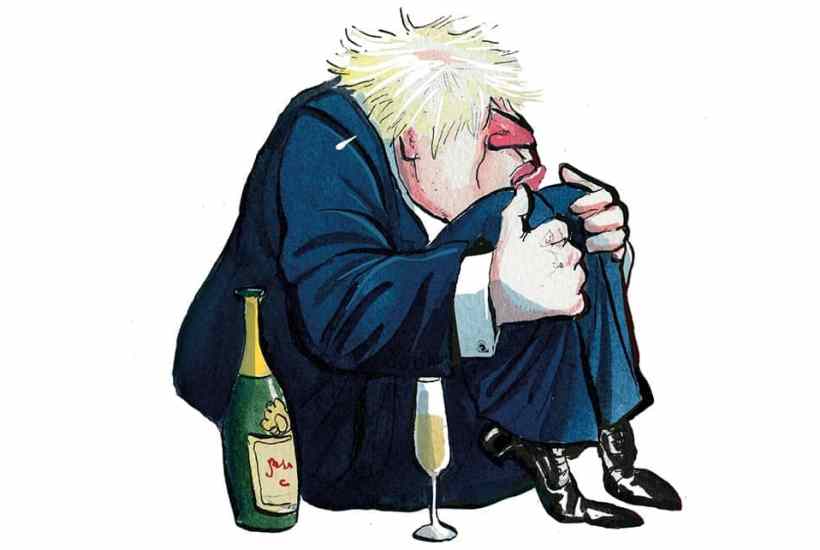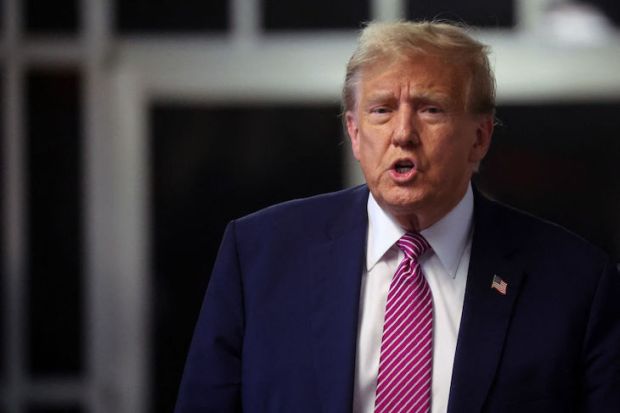Boris Johnson divides Britons in a way few other politicians manage. To his dwindling group of supporters, he is the hero who Got Brexit Done; to his detractors, he is a villain, edging the country towards a dark place. He is, according to Alastair Campbell, Britain’s ‘accidental fascist’. But if you stand back from the Westminster hurly-burly you can see Boris for what he is: a carefully constructed empty space onto which Britons have, over the years, been invited to project their hopes and fears; one whose purpose has been to further the personal ambition for power of the very real but (so far as the public are concerned) largely unknown Alexander Boris de Pfeffel Johnson.
Several years ago, TV presenter Lorraine Kelly won a tax case after a judge ruled she was not employed by ITV, but performs as her ‘chatty’ TV persona. Who is the real Lorraine Kelly, people asked. The answer was not clear. A similar question can be asked of politicians who have long accepted, some more reluctantly than others, the need to sell versions of themselves to the people, emphasising real aspects of their characters at best, and, at times, simply making things up. Ancient rulers did this through statues and coins. Today’s leaders have a plethora of means to project concocted versions of themselves. Boris is an extreme and distinct example of this process because politicians usually create such personas to advance policies or projects bigger than themselves: but Johnson has none to speak of beyond achieving and holding on to power for its own sake.
Boris’s public image has its origins in Johnson’s troubled childhood, although it was completed during the turn of the twenty-first century as Labour and the Conservatives fought for the middle ground. Under Tony Blair, Labour adopted parts of Thatcherism; when David Cameron became Tory leader, the Conservatives reciprocated. As a result, both parties talked against their own natures. This led to politicians speaking a constrained and sometimes meaningless language. In response, traditional Labour and Conservative supporters increasingly felt left behind; even middle ground voters believed they were being fooled: this was the time of fuel protests, voters ceasing to vote, the Countryside Alliance, demonstrations against the Iraq War, the rise of the British National Party and that of its more significant and polite successor Ukip.
When representative politics fails to do its job, people look for diversions. Johnson’s genius was to recognise the failure of the two party leaderships to actually represent the people. But Boris had no interest in solving any democratic problem; his interest was exploiting this situation for personal gain.
Johnson deliberately stood out from mainstream politicians by appearing to be ‘authentic’: how could that hair or that weird, bumbling, Latin-tagged argot not be real? It was the antithesis of the smooth personae presented by Blair, Cameron and their acolytes. Boris’s performance of authenticity was, in fact, the greatest trick played on the public by its highly-skilled creator, albeit one he learnt from those party leaders from whom he wanted to distinguish himself. Without the bland and smiley Blair and Cameron, the Boris act could not have existed.
If Boris’s political guise was simply a reaction to a time of bland, centrist politics it would have died when that moment passed with the 2008 financial crash. Yet Boris succeeded in surviving by presenting himself as a pro-EU, immigrant-friendly, liberal Conservative to win two terms in the predominantly Labour city of London. This posture would also help him during the time of bitter division when Brexit became the defining issue of the day.
As we know Johnson agonised over which way to jump. Having crafted his political image as that of a maverick, anti-political figure, the Brexit referendum forced Johnson to make an unwelcome choice. Did supporting Leave or Remain advance his personal interests? In the end, Johnson decided backing Leave while keeping his fingers crossed for a narrow Remain win best suited his path to power. This would give him the edge with Conservative members in any leadership contest without the inconvenience of having to take Britain out of the European Union if he became Prime Minister. As a result, Boris was, as Dominic Cummings said recently, ‘a briefly useful tool’ for Leave campaigners. And once he became leader, Boris also helped the Conservative party win over northern working-class voters in the 2019 general election, who otherwise would not have considered abandoning Labour.
Becoming Prime Minister with an 80-seat majority was, however, the worst thing that could have happened to Boris. If he enjoyed luck in navigating the treacherous waters of Brexit, the consequences of Covid and the Ukraine war have been harder to negotiate.
‘To govern is to choose,’ Pierre Mendès-France once said. And all prime ministers are eventually defined by the choices they make. But decisions are fatal for Boris, for whom an innate emptiness has been a key characteristic. Worse, the ‘partygate’ revelations showed the public something of the real Johnson, exposing as they did the inauthentic nature of Boris. People did not like what they saw.
Despite everything, Boris remains in No. 10, at least for now. Even if he clings on, however, Boris’s character has been dramatically transformed and weakened. Johnson’s own room for manoeuvre has disappeared. After barely surviving a confidence vote of his own MPs, to keep himself in power Johnson is now forced to rely on the European Research Groupand so to adhere to their highly factional and partisan agenda. No longer an empty space, or all things to all people, Boris is forced to pander to this narrow band of Tory MPs who speak for only a small minority of Britons. Boris was elected on the promise of getting Brexit ‘done’; now he is held in power by those who are less keen to move on from the Brexit wars.
Eventually, even this dwindling band of Tory MPs will tire of Boris. The Prime Minister has buried his head in the sand, insisting that he will stay and fight at least another election. But soon the men (and maybe even some women) in grey suits will come for him.
When they do, he will leave little trace, except a Conservative party more than usually confused as to what it stands for. There will be no Johnsonites fighting over a legacy: it will be as if Boris’s time in power never happened.
Got something to add? Join the discussion and comment below.
Get 10 issues for just $10
Subscribe to The Spectator Australia today for the next 10 magazine issues, plus full online access, for just $10.




















Comments
Don't miss out
Join the conversation with other Spectator Australia readers. Subscribe to leave a comment.
SUBSCRIBEAlready a subscriber? Log in